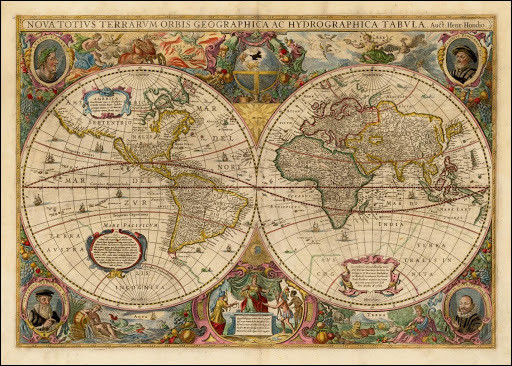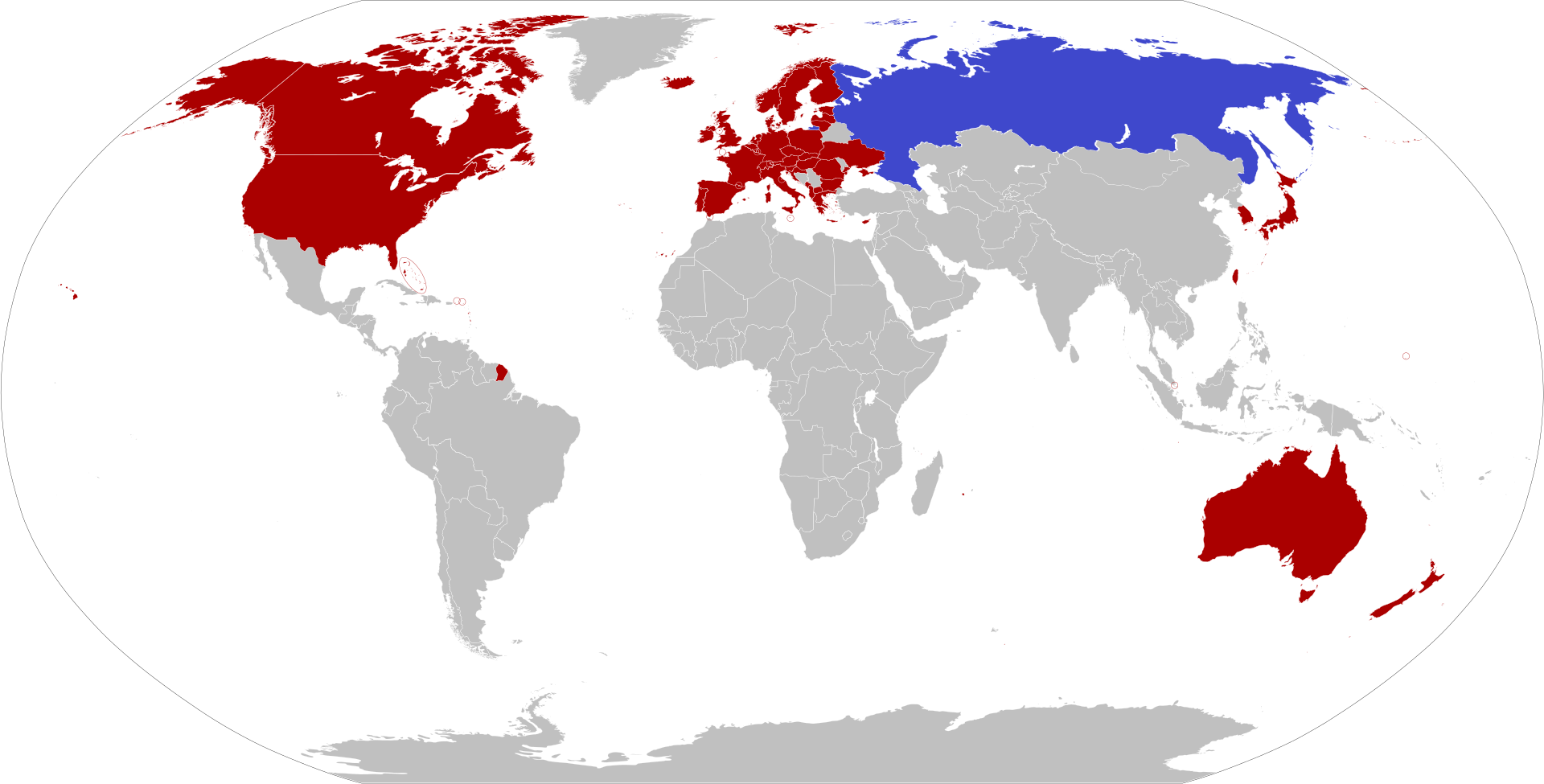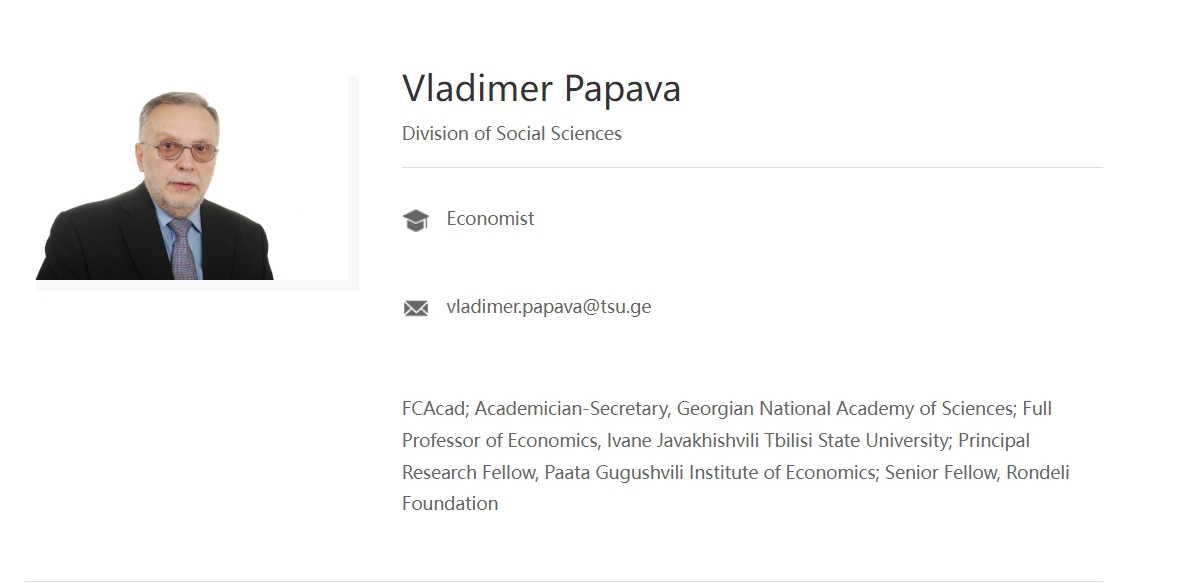


Author: Vladimer Papava, Full Fellow of the Academy
DOI: https://doi.org/10.61362/KRAC3227
The Covid–19 pandemic and Russia’s war in Ukraine, as well as the economic sanctions imposed by the West against Russia, have radically changed the decades-old, established world system of globalization.

(Image: World Economic Forum)
Due to the COVID–19 pandemic, many countries have had to suspend the functioning of a number of economic sectors. This, in turn, has caused disruptions in global supply chains (e.g. Rickards, 2022). If we add to this the fact that, especially at the beginning of the pandemic, many countries fought alone against the spread of coronavirus, then it is not surprising that the false impression of the supposed end of globalization and the beginning of de-globalization came about, which ultimately leads to isolationism (e.g. Derviş, Strauss, 2020).
At the same time, it was obvious that overcoming the pandemic, which by nature is a global phenomenon, on the basis of isolationism, is in principle impossible (Stiglitz, 2020). Moreover, many economists understood that post-pandemic economic development under conditions of isolationism, or at least de-globalization, was impossible (e.g. Fung, 2020).

(Image: Monash University)
The fundamental impossibility of globalization having come to an end is evidenced by the viability of the illegal global economy (e.g. drug trafficking, illegal arms trade, etc.). In particular, despite the fact that virtually all countries and international organizations (in particular Interpol) are fighting against it, the illegal global economy shows resilience and stability (Papava, 2022b). Moreover, it is the illegal global economy that is Russia’s main “ally” in the war against Ukraine (Papava, 2023), when companies from countries that have adopted economic sanctions against Russia find ways to do business in Russia, and with Russia bypassing these sanctions (e.g. Atasuntsev, 2023; Berman, 2023; Deen, 2023; Euronews, 2023; Race, 2024; Ruehl, 2022).
If we proceed from the fact that globalization, as such, cannot, in principle, end, then it is necessary to understand the nature of the changes in globalization itself.
Considering this problem, from the very beginning, it is necessary to answer the question of what exactly ended with the beginning of the pandemic. In fact, due to the onset of the pandemic, when global supply chains began to collapse, the so-called hyper-globalization (Rodrik, 2011), which was primarily based on economic globalization, ended. The reason for this is the discrepancy between the levels of economic and political globalization, when the latter lagged significantly behind the former (Kołodko, 2022). And in truth, at the initial stage of the pandemic, each country, as mentioned above, tried to individually cope with Covid–19, and international organizations (primarily the World Health Organization), which were supposed to coordinate the actions of individual governments, were left bewildered.
Thus, it was not globalization that ended, but hyper-globalization, which was replaced by turbulent globalization with the onset of the pandemic, when the global economy found itself in turbulent conditions (Papava, 2022d).

(Image: Harvard University)
With the outbreak of Russia’s war in Ukraine on February 24, 2022, and with the introduction of economic sanctions against Russia by the West (BBC, 2024), changes began to be seen in the architecture of the world’s economy – some countries supported these sanctions, others took the side of Russia, and the remainder chose to remain neutral (Papava, 2022c). As a result, the global economy has acquired a confrontational character, i.e., turbulent globalization has been replaced by confrontational globalization (Papava, 2022d; Papava, Maisaia, 2023). Despite the confrontational nature of the global economy, as noted above, violations of these sanctions have been repeatedly recorded.
Recognizing that instead of real de-globalization, in reality there was a pseudo de-globalization (Papava, 2021), economists began to predict the arrival of the so-called new “wave” of a higher and significantly improved level of globalization (El-Erian, 2020). In other words, the new “wave” of globalization can be interpreted as “better globalization” (Rodrik, 2022). At the same time, the question remains open about the content of the phrases “new wave of globalization” and “better globalization.”
In order to understand what “better globalization” means, it is necessary to take into account what main challenges and problems were put on the agenda at the beginning of the pandemic, and subsequently by Russia’s war in Ukraine and the introduction of economic sanctions by the West against Russia.

(Countries on Russia's "Unfriendly Countries List")
As one would expect, the pandemic and Russia’s war in Ukraine, together with economic sanctions, have aggravated issues related to security in general (Myerson, 2020), as well as energy (UN, 2021) and food security (Blair, Kalibata, 2020) in particular.
If we proceed from the fact that, both theoretically and practically, the emergence of new pandemics of a global nature cannot be ruled out, then issues related to economic security become of paramount importance. Let us note here that wars, both present and future, also aggravate issues of the economic security of a particular country, region, and even the world as a whole.
Thus, “better globalization,” in my opinion, should be understood as globalization with economic security (Papava, 2022a), which will replace confrontational globalization. As I see it, globalization with economic security can become a modern understanding of economic nationalism (Rodrik, 2023).
Equally important in the context of economic security is the creation of more resilient global supply chain networks (Marin, 2021; Todo et al., 2023; Zeihan, 2022). To this end, measures such as “reshoring” or “onshoring” (repatriation of enterprises located in distant countries), “nearshoring” (relocation of enterprises located in distant countries to neighboring countries) and “friendshoring” or “allyshoring” (relocation of enterprises from distant countries to those countries that adhere to similar values) have now become relevant (Kessler, 2022). It is obvious that these measures are a departure from the principles of free trade (Rajan, 2022; Zeihan, 2022), which will necessarily affect the growth of production costs. However, these measures are forced due to frequent disruptions in global supply chains (Krugman, 2024).

(Image: Cato Institute)
According to Nobel laureate in economics Michael Spence, to properly assess the current reality in the global economy, economists need to develop models to predict the development of global supply chains, taking into account their likely reactions to possible shocks (Spence, 2021).
It should be noted that reshoring, nearshoring and friendshoring do not mean the disappearance of globalization, but instead the strengthening of regionalization within the framework of globalization itself (O’Neil, 2022).
It is in the context of regionalization of economic security that some publications of late (e.g. He, 2024) have used the term “glocalization” in the same sense in which I use the term “globalization with economic security.” This interpretation of “glocalization”, in my opinion, is not entirely correct.
The fact is that the term “glocalization,” which is obtained by combining two terms – “globalization” and “localization,” and which was introduced into scientific use by sociologist Roland Robertson back in 1980, means the adaptation of products produced on a global scale to local markets (e.g. Blatter, n.d.; Hayes, 2022). One clear example of glocalization is an auto manufacturing company’s installation of a steering wheel on the left or right side of a vehicle depending on whether said vehicle will be sold in a country with right– or left–hand traffic. Obviously, the term and content behind “glocalization” has nothing to do with national or economic security.
In conclusion, I note that a fairly wide frontier for studying the specific features of globalization which economic security is opening up for economists and other representatives of the social sciences.

Vladimer Papava is a Fellow of the Academy in the Division of Social Sciences. He is currently a Professor of Economics at the Ivane Javakhishvili Tbilisi State University and an Academician-Secretary at the Georgian National Academy of Sciences. He is also an Academician at the Georgian National Academy of Sciences. Prof. Papava is an internationally recognized economist, who has previously served as Minister of the Economy of Georgia and Rector of the Ivane Javakhishvili Tbilisi State University.
References
Atasuntsev A. (2023). “A Loophole in the Sanctions.” Verstka, August 9, <https://verstka.media/a-loophole-in-the-sanctions-sanctioned-goods-of-almost-all-types-worth-billions-of-dollars-are-imported-into-russia>.
BBC (2024). “What Are the Sanctions on Russia and Have They Affected Its Economy?” BBC, February 23, <https://www.bbc.com/news/world-europe-60125659>.
Berman I. (2023). “Western Business Is Still Sustaining Russia’s War.” The Hill, January 30, <https://thehill-com.cdn.ampproject.org/c/s/thehill.com/opinion/international/3835419-western-business-is-still-sustaining-russias-war/amp/?fbclid=IwAR3RxedQEewOrlkDaoT7QB7N7cbfN_5z-gQnaM_2-OhOIhhIlayQN8fQsbA>.
Blair T., Kalibata A. (2020). “Building Food Security During the Pandemic.” Project Syndicate, May 7, <https://www.project-syndicate.org/commentary/four-ways-to-boost-food-security-during-covid19-pandemic-by-tony-blair-and-agnes-kalibata-2020-05>.
Blatter J. (n.d.). “Glocalization.” Britannica Money, <https://www.britannica.com/money/glocalization>.
Deen T. (2023). “Iranian Drones Include US and Western Components.” Eurasia Review, January 11, <https://www.eurasiareview.com/11012023-iranian-drones-include-us-and-western-components-oped/?fbclid=IwAR3cvzUIiJRQdnljaN-2J5s7KXDRZpz_7lTkmPrSr7wEzjNed__V_o3gRVc>.
Derviş K., Strauss S. (2020). “What COVID–19 Means for International Cooperation.” Project Syndicate, March 6, <https://www.project-syndicate.org/commentary/global-cooperation-can-prevent-next-pandemic-by-kemal-dervis-and-sebasti-n-strauss-2020-03>.
El-Erian M. A. (2020). “Navigating Deglobalization.” Project Syndicate, May 11, <https://www.project-syndicate.org/commentary/covid19-deglobalization-two-priorities-by-mohamed-a-el-erian-2020-05>.
Euronews. (2023). “More than 550 Global Companies are Still Doing Business in Russia. Many are European.” Euronews, January 20, <https://www.euronews.com/my-europe/2023/01/20/more-than-550-global-companies-are-still-doing-business-in-russia-many-are-european?fbclid=IwAR0c3-2aRZZKMu8UgDT2fVFLBabzhfjxpTjBHCKdaRU8LsPiC428xTo0grs>.
Fung V. K. (2020). “The Trade Cure for the Global Economy.” Project Syndicate, April 22, <https://www.project-syndicate.org/commentary/covid19-crisis-revive-multilateralism-open-trade-by-victor-k-fung-2020-04>.
Hayes A. (2022). “Glocalization: What It Means, Advantages, and Examples.” Investopedia, August 30, <https://www.investopedia.com/terms/g/glocalization.asp>
He J. (2024). “Deglobalization and Glocalization in the Current World.” Eurasia Review, February 29, <https://www.eurasiareview.com/29022024-deglobalization-and-glocalization-in-the-current-world-analysis/>.
Kessler S. (2022). “What Is ‘Friendshoring’?” The New York Times, November 18, <https://www.nytimes.com/2022/11/18/business/friendshoring-jargon-business.html>.
Kołodko G. W. (2022). “The Irreversibility of Globalization.” Project Syndicate, September 5, <https://www.project-syndicate.org/commentary/globalization-and-multilateral-cooperation-not-ending-by-grzegorz-w-kolodko-2022-09>.
Krugman P. (2024). “Stuck Ships and Supply-Chain Inflation.” The New York Times, April 2, <https://www.nytimes.com/2024/04/02/opinion/baltimore-bridge-inflation-supply-chain.html>.
Marin D. (2021). “Making Supply Chains More Resilient” Project Syndicate, July 27, <https://www.project-syndicate.org/commentary/should-governments-help-to-boost-supply-chain-resilience-by-dalia-marin-2021-07>.
Myerson R. B. (2020). “How America Should Redefine Its National Security After Pandemic.” The Hill, October 9, <https://thehill.com/opinion/national-security/520326-how-america-should-redefine-its-national-security-after-pandemic/>.
O’Neil S. K. (2022). The Globalization Myth: Why Regions Matter. New Haven, Yale University Press.
Papava V. (2021). “On Pseudo De-Globalization, Silk Road of Global Value Chains and Role of Georgia.” Eurasia Review, October 18, <https://www.eurasiareview.com/18102021-on-pseudo-de-globalization-silk-road-of-global-value-chains-and-role-of-georgia-oped/>.
Papava V. (2022a). “Moving from Hyper-Globalization.” Eurasia Review, October 28, <https://www.eurasiareview.com/28102022-moving-from-hyper-globalization-oped/?fbclid=IwAR2pYf4-drq_z0j5oF9mad6BO8SrjxvsRUbd7ebBjdtt6Fp14jYVZiVITq0>.
Papava V. (2022b). “On Illegal Globalization, or Can Globalization Ever End?” Eurasia Review, December 19, <https://www.eurasiareview.com/19122022-on-illegal-globalization-or-can-globalization-ever-end-oped/>.
Papava V. (2022c). “On the Main Challenges of the Architecture Transformation of the World Economy.” Eurasia Review, March 31, < https://www.eurasiareview.com/31032022-on-the-main-challenges-of-the-architecture-transformation-of-the-world-economy-oped/>.
Papava V. (2022d). “Pandemic, War and Economic Sanctions: From Turbulent to Confrontational Globalization.” Eurasia Review, May 23, <https://www.eurasiareview.com/23052022-pandemic-war-and-economic-sanctions-from-turbulent-to-confrontational-globalization-oped/>.
Papava V. (2023). “Illegal Globalization Is Russia’s Main ‘Ally’ Against the West.” Eurasia Review, February 9, < https://www.eurasiareview.com/09022023-illegal-globalization-is-russias-main-ally-against-the-west-oped/>.
Papava V., Maisaia V. (2023). “On Economic Security under Confrontational Globalization and the Main Concepts of Geo-Economic Warfare.” Bulletin of the Georgian National Academy of Sciences, 17(4): 116–120.
Race M. (2024). “Russian Oil Getting into UK via Refinery Loophole, Reports Claim.” BBC, February 5, <https://www.bbc.com/news/business-68018660>.
Rajan R. G. (2022). “Just Say No to “Friend-Shoring”.” Project Syndicate, January 3, <https://www.project-syndicate.org/commentary/friend-shoring-higher-costs-and-more-conflict-without-resilience-by-raghuram-rajan-2022-06>.
Rickards J. (2022). Sold Out: How Broken Supply Chains, Surging Inflation, and Political Instability Will Sink the Global Economy. New York, Portfolio.
Rodrik D. (2011). The Globalization Paradox: Democracy and the Future of the World Economy. New York, W. W. Norton & Co.
Rodrik D. (2022). “A Better Globalization Might Rise from Hyper-Globalization’s Ashes.” Project Syndicate, May 9, <https://www.project-syndicate.org/commentary/after-hyperglobalization-national-interests-open-economy-by-dani-rodrik-2022-05?barrier=accesspaylog>.
Rodrik D. (2023). “Doing Economic Nationalism the Right Way.” Project Syndicate, November 7, <https://www.project-syndicate.org/commentary/east-asian-model-vindicates-economic-nationalism-by-dani-rodrik-2023-11>.
Ruehl J. P. (2022). “Sanctions Batter Russia as the Kremlin Attempts to Overcome Them.” Eurasia Review, December 6, <https://www.eurasiareview.com/06122022-sanctions-batter-russia-as-the-kremlin-attempts-to-overcome-them-oped/>.
Spence M. (2021). “Why Are Supply Chains Blocked?” Project Syndicate, November 3, <https://www.project-syndicate.org/commentary/prevent-future-supply-chain-disruptions-using-ai-models-by-michael-spence-2021-11>.
Stiglitz J. E. (2020). “Plagued by Trumpism.” Project Syndicate, March 9, <https://www.project-syndicate.org/commentary/trump-coronavirus-failure-of-small-government-by-joseph-e-stiglitz-2020-03>.
Todo Y., Oikawa K., Ambashi M., Kimura F., Urata S. (2023). “Robustness and Resilience of Supply Chains During the COVID–19 Pandemic.” World Economy, 46(6): 1843–1872.
UN (2021). “Enhancing Energy Security in the Context of the Coronavirus Disease Pandemic for a Greener, More Resilient and Inclusive Energy Future in the Region.” UN Economic and Social Council, February 1, <https://www.unescap.org/sites/default/d8files/event-documents/ESCAP_77_17_E.pdf>.
Zeihan P. (2022). The End of the World Is Just the Beginning: Mapping the Collapse of Globalization. New York, Harper Business.